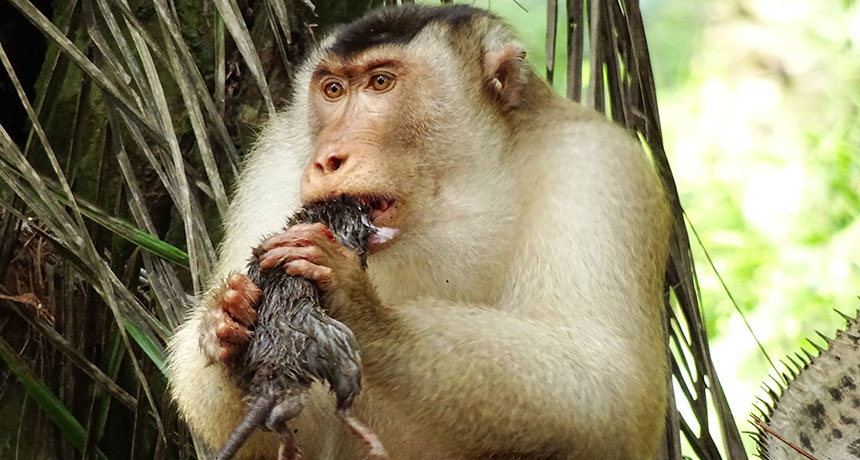After years of study and observation, new research from the University of Leipzig and Universiti Sains Malaysia has concluded that the pig-tailed macaque, often branded a scourge of palm oil plantations, actually does a lot more good than harm when it comes to keeping away the real vermin: rats.
The research, published yesterday in the journal Current Biology, found that instead of being the fruit-eating pests they are often characterized to be, the monkeys’ actual impact on fruit consumption is rather minimal, and instead, the animals are responsible for consuming up to 75 percent of the rats found scurrying among the palms.
Malaysia is the world’s leading producer of palm oil, accounting for around 19.5 million tons annually, or 30 percent of the world’s output.
Researchers studied the impact of the primates at Perak’s Segari Melintang Forest Reserve between January of 2016 and September of last year, and observed that monkeys spent an average of three hours per day perusing the plantations, eating about 12.4 tons of fruit per year. While that may seem like a lot, it’s actually only 0.56 percent of the total production inside the monkeys’ limited munching radius.
Rats, meanwhile, cause much greater loss of fruit, wolfing down 18 times as much fruit as macaques, accounting for a 10 percent decrease in output due to consumption.
But the fun Animal Kingdom facts don’t end there — no siree, Bob! What biologists found was that left to their own devices, the monkeys were actually able to reduce the rat population by 75 percent because they were natural predators.
What does this mean for farmers? Well, instead approaching the macaques as pests, they could theoretically use them in place of ineffective, expensive, and unhealthy rodenticides.
“I was stunned when I first observed that macaques feed on rats in plantations,” Sains researcher Nadine Ruppert said in a press release.
“I did not expect them to hunt these relatively large rodents, or that they would even eat so much meat. They are widely known to be [fruit-eating] primates who only occasionally feast on small birds or lizards.”
Pig-tailed macaques are considered a vulnerable species, mostly due to habitat loss and hunting. Palm oil plantations are the cause for much of this habitat loss, with huge swathes of land systematically cleared to make way for oil palms.
So here’s the lesson for all you farmers and plantation owners out there: keep your macaques alive and happy by preserving their forest home, and they’ll keep you happy by murdering the hell out of those pesky rats. They end up full of delicious rat meat, and you don’t have to spend as much on nasty-ass chemicals. It’s a win-win!





Reader Interactions